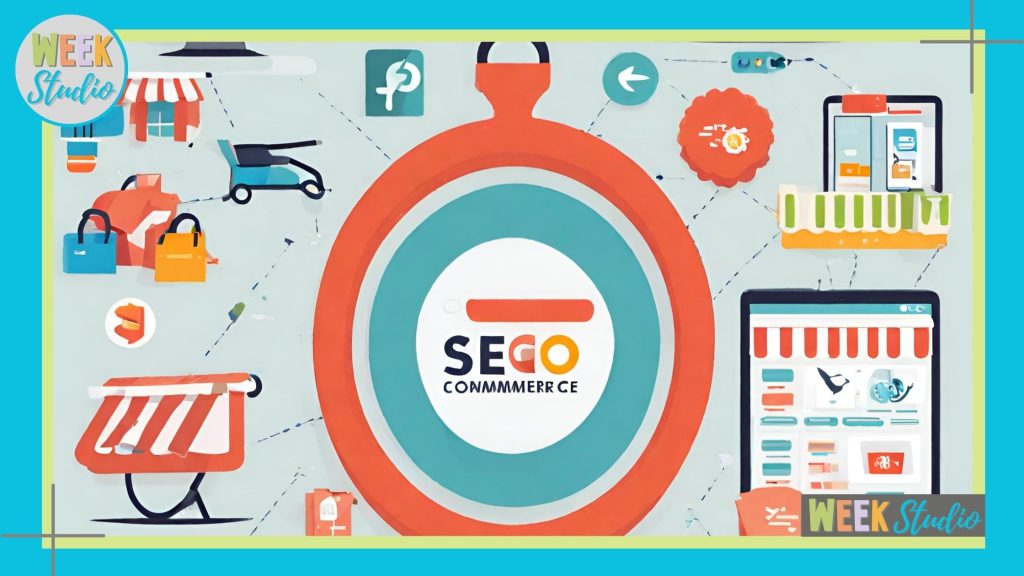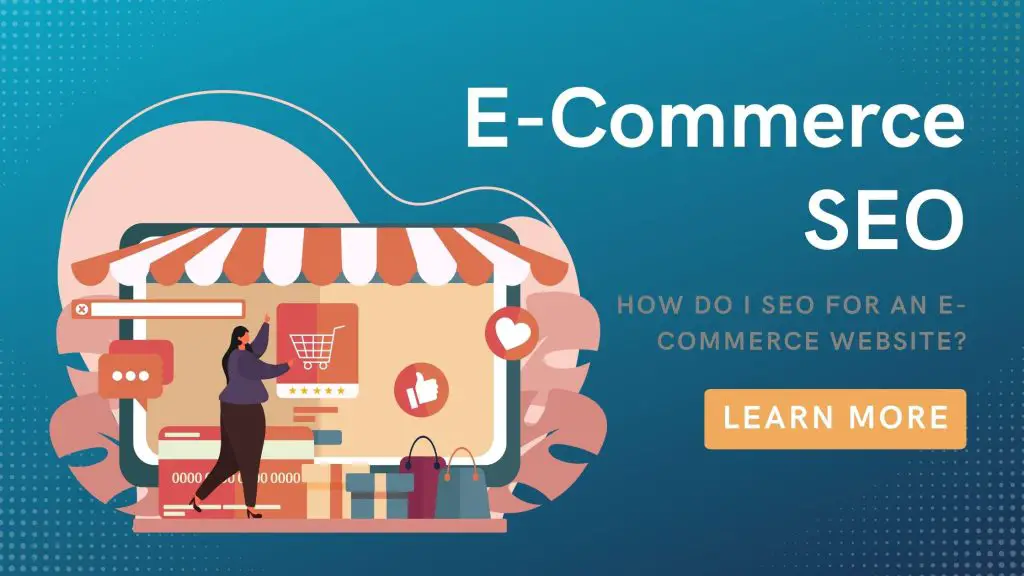Welcome to Week Studio where the heartbeat of commerce echoes through online storefronts. In the bustling world of e-commerce, it’s not just about having a stunning website and a lineup of irresistible products; it’s about ensuring that your digital storefront is easily discoverable in the vast landscape of the internet. This is where the art and science of Search Engine Optimization (SEO) come into play.
Imagine having a beautifully crafted store, stocked with top-notch products, but potential customers can’t find it amidst the sea of online options. That’s where the magic of SEO comes in. In this digital age, understanding how to fine-tune your e-commerce website for search engines is not just a good practice—it’s the key to unlocking the door to online success.
In this comprehensive guide, we will delve into the intricacies of SEO for e-commerce websites, exploring strategies and techniques to enhance your online visibility, drive traffic, and ultimately, boost your sales. From deciphering the significance of targeted keywords to mastering the art of crafting SEO-friendly product descriptions, this journey promises to equip you with the knowledge and tools needed to navigate the competitive e-commerce landscape successfully. So, buckle up as we embark on a journey to unravel the mysteries of SEO and discover how it can transform your e-commerce venture into a digital powerhouse.
What Is An Ecommerce SEO

In the vast expanse of the digital marketplace, where countless online stores vie for attention, standing out is not just a goal, it’s a strategic imperative. At the core of this strategic dance lies the fundamental concept of E-Commerce SEO. Let’s dive into what this entails and why it is the linchpin of success in the competitive world of online retail.
There are a variety of techniques that can be used to optimize a website, including on-page optimization, link building, and social media optimization. Link building includes creating links from other websites to your website, and social media optimization includes optimizing your website’s social media presence. SEO is an important part of any online marketing strategy, and it should be a part of your overall marketing plan. By optimizing your website, you can improve your website’s rank and visibility, which can result in more website visitors and more customers.
The Importance of Visibility
In a virtual marketplace that never sleeps, visibility is the currency of success. Picture your e-commerce website as a brick-and-mortar store situated on a bustling street. The more people passing by, the higher the chances of attracting customers. Similarly, in the online world, the higher your website ranks on search engines, the more likely it is to be discovered by users actively looking for products or services you offer.
E-Commerce SEO is not merely a technical checklist; it’s a strategic approach to ensure that your online store becomes a beacon amidst the digital noise, guiding potential customers straight to your virtual doorstep. The better your SEO, the more visible and accessible your products become, ultimately translating into increased traffic, conversions, and revenue.
As we embark on this exploration of E-Commerce SEO, keep in mind that it’s not just about appeasing search engine algorithms; it’s about creating an online shopping experience that aligns with the needs and preferences of your target audience. So, let’s unravel the layers of E-Commerce SEO and discover how to make your digital storefront shine in the vast online marketplace.
How Much Is Ecommerce SEO?

The cost of ecommerce SEO can vary depending on a number of factors. Generally, the amount of work that needs to be done in order to improve your site’s search engine ranking will depend on the competitiveness of your industry, the age and size of your website, and the current online marketing efforts you are employing.
Some companies may offer a flat fee for a predetermined number of hours of work, while others may charge an hourly rate. There are also a number of factors that can influence the overall cost of ecommerce SEO, including the following:
- The N° of key-words you will target
- The level of competition for those keywords
- The complexity of your website’s architecture
- The amount of content you currently have on your website
- The quality of your website’s content
- The age and size of your website
- The number of inbound links you currently have
- The quality of your inbound links
- The number of pages on
Finally, the cost of ecommerce SEO will also vary depending on the size and complexity of the website. Larger and more complex websites will require more time and effort to optimize, resulting in a higher cost for ecommerce SEO services.
How Long Does Ecommerce SEO Take?

There is no definitive answer to this question as SEO is an ever-evolving and complex field. However, in general, SEO for an ecommerce store can take anywhere from a few months to a year or more to achieve significant results. The first step in any successful SEO campaign is a comprehensive analysis of the website to identify any areas that need improvement. This includes evaluating the website’s architecture, on-page content, technical SEO, and backlinks. Once the analysis is complete, the SEO team can develop a strategy to address any issues and improve the website’s search engine visibility.
It is important to note that SEO is not a one-time process and requires ongoing effort and maintenance. The SEO team must continually work to improve the website’s SEO and keep up with the latest changes in the search engine algorithms. In general, SEO for an ecommerce store can take anywhere from a few months to a year or more to achieve good results, and the results will continue to improve over time as the SEO team works to improve the website. The following are some of the main areas that the SEO team will focus on in order to improve the website’s SEO:
How Does SEO Work For An E-Commerce Store?
There are many different ways to optimize an e-commerce store for search engines. However, the most important factor is to ensure that your website is crawlable and indexable. This means that search engine crawlers can easily find and crawl your pages, and that your pages are properly indexed by the search engine. There are a few key ways to make your website crawlable and indexable:
- Use clear and concise titles for your pages.
- Use descriptive metatags for your pages.
- Use text-based links, rather than image-based links.
- Make sure your website is properly formatted for the search engine.
- Submit your website to the search engine’s index.
Once your website is properly indexed, you can start to optimize it for search engines. The most important factor is to ensure that your website’s content is relevant to your target keywords. You can do this by including your target keywords in your website’s content, as well as in the titles of your web pages and in the metatags of your website. You can also use keyword-rich anchor text in your website’s links. Another important factor is the frequency with which your website is updated. You can use a content management system to make it easy for you to update your website’s content frequently.
How Do I Get SEO Results For Ecommerce?

There is no one definitive answer to this question, as SEO strategies vary greatly depending on the specific ecommerce website and its products or services. However, there are a number of general tips that can help ecommerce businesses improve their SEO ranking and visibility.
One of the most important things ecommerce businesses can do to improve their SEO is to make sure their website is optimized for search engines. This includes ensuring that the site’s title tags, meta descriptions, header tags and other on-page elements are correctly optimized. It is also important to make sure the website’s content is high quality and relevant to its target audience.
In addition, ecommerce businesses should make sure they are using the correct keywords and phrases in their website and content. Keywords should be included in the website’s title tags, meta descriptions, header tags, and throughout the website’s content. Additionally, businesses should use Google AdWords to create targeted ad campaigns around specific keywords and phrases.
Is SEO Worth It For Ecommerce?
The short answer is, unequivocally, YES. SEO is a valuable ecommerce investment that can drive significant traffic and revenue growth for online stores. The long answer is a bit more nuanced. SEO is not a silver bullet that will solve all of your marketing challenges or automatically result in increased traffic and conversions. However, when executed correctly, SEO can be a powerful tool that can help you reach more customers, improve your site’s visibility, and boost your bottom line.
SEO is the practice of optimizing your website and its content to rank higher in search engine results pages (SERPs), optimizing your website for search engines is the process of improving the visibility and ranking of your website in search engine results pages (SERPs). There are a number of factors that you can optimize, including your website’s title, description, header tags, and images.
One of the most important aspects of optimizing your website is creating high-quality content. This content should be relevant to your target audience and keyword phrases, and it should be updated regularly. In order to improve your website’s ranking, you should also make sure that your website is linked to from other high-quality websites. If you want to learn more about optimizing your website for search engines, contact us today. We can help you create a strategy that will improve your website’s ranking and visibility.
What Is The Best Tools For Ecommerce SEO?

In the dynamic world of E-Commerce SEO, having the right set of tools at your disposal can make the difference between merely existing in the digital space and thriving as a competitive force. Let’s explore some of the best tools that can empower you to fine-tune your e-commerce website, boost visibility, and stay ahead of the curve.
Google Analytics: Unveil Insights, Make Informed Decisions
Google Analytics is the cornerstone of understanding your website’s performance. From tracking visitor behavior and demographics to analyzing traffic sources, this powerful tool provides invaluable insights. For e-commerce websites, it’s a treasure trove for understanding customer journeys, identifying high-performing pages, and optimizing your site based on real data.
Ahrefs: Master the Art of Backlink Analysis
Backlinks play a crucial role in SEO, and Ahrefs is a standout tool for backlink analysis. Explore your website’s backlink profile, spy on competitors, and discover new link-building opportunities. With features like Site Explorer and Content Explorer, Ahrefs equips you with the data needed to refine your backlink strategy and enhance your website’s authority.
SEMrush: Your All-in-One SEO Toolkit
SEMrush is a comprehensive SEO toolkit that covers everything from keyword research to site audit. For e-commerce, it excels in revealing competitor strategies, finding profitable keywords, and tracking the performance of your product listings. Uncover the keywords that drive traffic, analyze advertising strategies, and stay informed about changes in search trends.
Yoast SEO: Optimize Content Like a Pro
For websites running on WordPress, Yoast SEO is a game-changer. This plugin seamlessly integrates with your content creation process, offering real-time SEO analysis as you write. From optimizing product descriptions to ensuring proper use of headings and meta tags, Yoast SEO guides you in creating content that is not only engaging but also search-engine-friendly.
Moz Pro: Elevate Your SEO Strategy
Moz Pro is a robust suite of SEO tools catering to various aspects of online optimization. From keyword research and rank tracking to site audits and link analysis, Moz Pro empowers e-commerce businesses to refine their SEO strategies. The “Page Optimization” feature provides actionable insights for improving individual pages, ensuring that every product listing is optimized for maximum visibility.
Google Search Console: Communicate Effectively with Search Engines
A direct line of communication with Google, the search engine giant. Google Search Console provides essential data about how your site appears in search results. Identify indexing issues, submit sitemaps, and receive alerts about potential problems. For e-commerce websites, it’s a vital tool to ensure that your product pages are being properly crawled and indexed.
These tools form the backbone of an effective E-Commerce SEO strategy, enabling you to navigate the intricacies of online optimization with precision and insight. As you embark on your SEO journey, consider incorporating these tools into your arsenal to enhance your website’s visibility, attract the right audience, and drive conversions. Remember, in the ever-evolving landscape of e-commerce, staying ahead often means having the right tools at your fingertips.
Conclusion

Embarking on the journey of optimizing your e-commerce website for search engines is not merely a task; it’s a strategic investment in the success of your digital venture. As we conclude this exploration into the realm of E-Commerce SEO, let’s recap the key takeaways and emphasize the ongoing nature of this dynamic practice.
The tools at your disposal are not just ornaments; they are beacons of insight. Leverage analytics tools to track and analyze the performance of your website continually. From user behavior to keyword rankings, let data guide your decisions. This iterative approach ensures that your SEO strategy is not based on assumptions but grounded in real-world results.
In the ever-shifting landscape of online commerce, mastering E-Commerce SEO is akin to navigating a dynamic marketplace. Stay agile, adapt to change, and keep refining your approach to meet the evolving needs of both search engines and your audience.
As you implement the strategies and insights gained from this journey into your e-commerce venture, remember that success is not a destination but a continuous pursuit. Keep optimizing, keep innovating, and watch as your online store rises through the digital ranks, capturing the attention and loyalty of your target audience. Here’s to your e-commerce success, driven by the power of strategic SEO!
